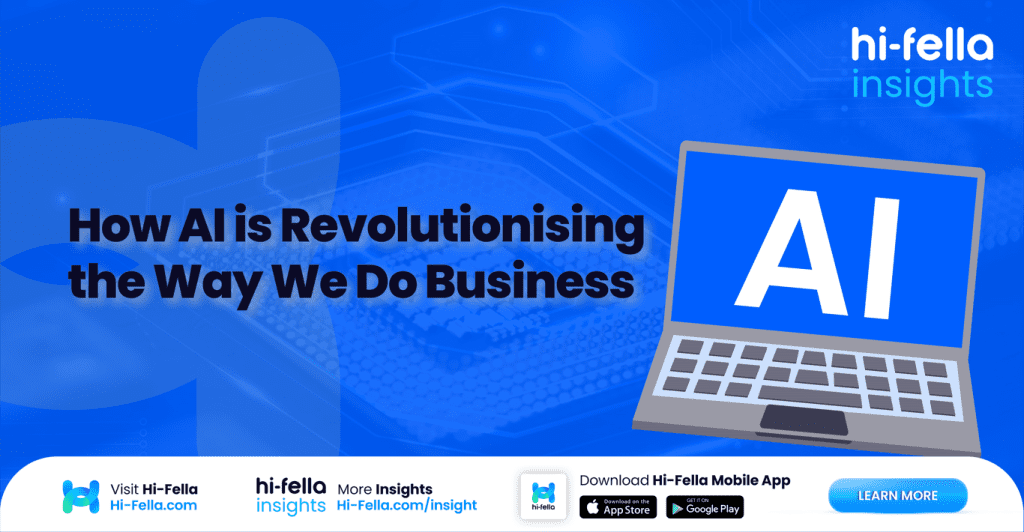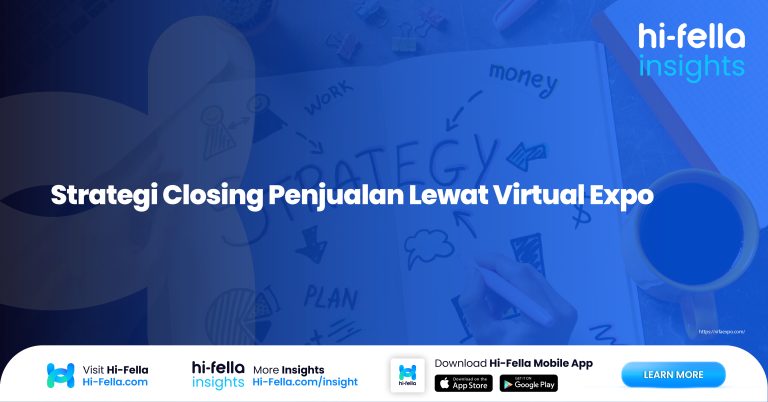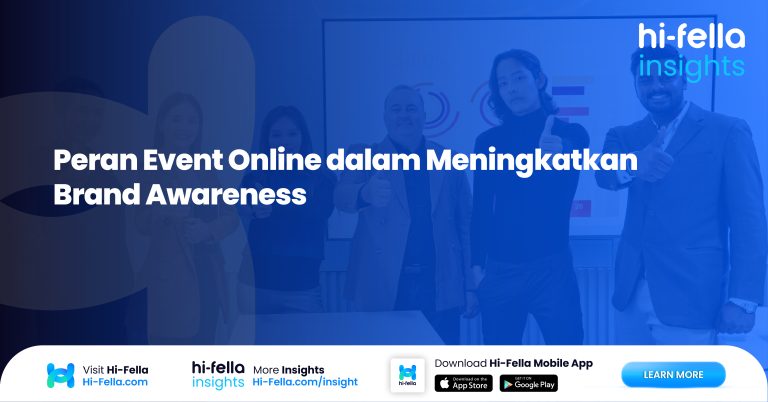Artificial Intelligence (AI) has transformed the business landscape, driving efficiency, innovation, and global connectivity. From automating mundane tasks to enhancing customer experiences, AI is redefining how businesses operate. Companies that leverage AI are staying ahead of the competition, reducing operational costs, and making data-driven decisions with greater accuracy.
This article explores how AI is revolutionising business operations, from customer service and marketing to supply chain management and data security. We’ll also discuss how platforms like Hi-Fella are leveraging AI to help businesses connect with buyers and suppliers worldwide, streamlining global trade through virtual exhibitions and real-time communication tools.
AI-Driven Automation: Boosting Efficiency and Productivity
The Rise of Intelligent Automation
AI-powered automation is replacing repetitive manual tasks, allowing businesses to focus on strategic decision-making and customer engagement. With machine learning and robotic process automation (RPA), companies can now streamline workflows and improve efficiency.
Key Areas of AI-Driven Automation
- Administrative Task Automation: AI reduces the need for manual data entry, appointment scheduling, and invoicing, saving time and reducing errors.
- Customer Support Automation: Chatbots and AI-powered virtual assistants handle routine inquiries, process orders, and provide instant support, reducing wait times and improving customer satisfaction.
- HR and Recruitment Automation: AI-powered recruitment tools scan resumes, conduct preliminary interviews, and match candidates to job roles, reducing hiring time and human bias.
Business Benefits
- Time and cost savings through automated workflows.
- Enhanced employee productivity by allowing workers to focus on higher-value tasks.
- Improved accuracy and consistency in business processes.
AI in Customer Experience: Personalisation at Scale
How AI Enhances Customer Interactions
Consumers today expect fast, personalised experiences, and AI makes it possible by analyzing customer data and predicting user preferences. Companies can tailor content, recommendations, and responses in real-time, leading to higher engagement and customer loyalty.
AI-Powered Personalisation Strategies
- Chatbots and Virtual Assistants: AI chatbots offer 24/7 support, answering customer queries, handling complaints, and providing product recommendations.
- Predictive Analytics: AI analyses past purchasing behavior to predict future needs and recommend products tailored to individual preferences.
- Sentiment Analysis: AI tools scan social media, customer reviews, and feedback to assess brand perception and adjust marketing strategies accordingly.
Business Benefits
- Higher customer satisfaction and engagement through real-time interactions.
- Increased sales and conversions by providing personalised recommendations.
- Improved brand loyalty by addressing customer needs proactively.
AI in Marketing: Smarter Campaigns and Better ROI
Transforming Marketing with AI
AI is changing the way businesses market their products and services, helping brands analyse vast amounts of data, identify trends, and automate marketing campaigns for better reach and impact.
AI-Driven Marketing Strategies
- Programmatic Advertising: AI places ads in front of the right audience at the right time, optimising ad spend and increasing conversion rates.
- Content Generation: AI tools like GPT-4 help create high-quality blogs, social media posts, and ad copy tailored to audience interests.
- Social Media Analytics: AI monitors engagement, tracks trends, and recommends the best posting times for maximum reach.
Business Benefits
- More effective targeting through data-driven insights.
- Higher return on investment (ROI) for marketing campaigns.
- Better engagement and conversion rates due to precise audience segmentation.
AI in Supply Chain and Logistics: Reducing Costs and Enhancing Efficiency
Optimising the Supply Chain with AI
Supply chain management is one of the most complex aspects of business, and AI is revolutionising how goods are tracked, stored, and delivered worldwide. AI-powered logistics solutions help companies predict demand, reduce waste, and optimise delivery routes.
AI Applications in Logistics
- Demand Forecasting: AI analyses historical sales data and market trends to predict demand fluctuations, helping businesses manage inventory more efficiently.
- Automated Warehousing: AI-driven robots handle warehouse operations, sorting, packing, and restocking goods with high precision.
- Smart Route Planning: AI determines the most efficient delivery routes, reducing transportation costs and delivery times.
Business Benefits
- Lower operational costs through optimised logistics.
- Faster and more reliable deliveries to improve customer satisfaction.
- Greater transparency in the supply chain through AI-powered tracking systems.
AI in Financial Management: Smarter Decision-Making
AI-Powered Financial Solutions
AI is transforming finance departments by automating processes, detecting fraud, and providing real-time financial insights. Businesses can now make smarter, data-driven financial decisions with greater accuracy.
AI Applications in Finance
- Fraud Detection: AI analyses transaction patterns to detect suspicious activities and prevent financial fraud.
- Automated Bookkeeping: AI-powered tools track transactions, generate reports, and reconcile accounts automatically.
- Credit Risk Analysis: AI evaluates creditworthiness for loans, reducing human bias and enhancing risk assessment accuracy.
Business Benefits
- Reduced financial risks through AI-driven fraud detection.
- Improved cash flow management with automated financial tracking.
- More informed investment decisions based on predictive analytics.
AI in Cybersecurity: Protecting Businesses from Digital Threats
Enhancing Security with AI
With cyber threats evolving, AI plays a crucial role in detecting and mitigating security risks. AI-powered security systems monitor networks in real time and prevent data breaches before they occur.
AI-Powered Cybersecurity Solutions
- Threat Detection & Prevention: AI detects anomalies and prevents cyberattacks by analysing patterns in real-time.
- Automated Incident Response: AI reacts instantly to security breaches, reducing response time and potential damage.
- Biometric Security & Authentication: AI-powered facial and voice recognition enhance security for digital transactions and data access.
Business Benefits
- Greater protection against cyber threats and data breaches.
- Reduced downtime and financial loss due to cyberattacks.
- Improved trust and compliance with data security regulations.
How Hi-Fella Uses AI to Revolutionise Global Trade
Hi-Fella: AI-Powered Online Exhibitions
Hi-Fella is an AI-driven business networking platform that connects global buyers and suppliers through virtual trade shows and exhibitions. The platform leverages AI to enhance international trade efficiency and networking opportunities.
Key AI-Driven Features of Hi-Fella
- AI-Powered Business Matching: Smart algorithms recommend the best business partners based on preferences, industry, and trade history.
- Real-Time Language Translation: AI removes language barriers, enabling seamless communication between global traders.
- Data-Driven Market Insights: Hi-Fella provides AI-powered analytics to help businesses make informed trade decisions.
- 24/7 Virtual Exhibitions: Unlike physical trade shows, businesses can showcase their products year-round in a cost-effective manner.
The Future of AI in Business
AI is no longer a futuristic concept—it is actively transforming businesses across industries, making them more efficient, innovative, and customer-centric. From automation and personalised marketing to supply chain optimisation and cybersecurity, AI is reshaping how companies operate on a global scale.
For businesses looking to expand internationally and connect with global buyers and suppliers seamlessly, Hi-Fella provides the perfect AI-powered solution. With smart business matching, real-time translation, and virtual exhibitions, Hi-Fella ensures effortless global trade opportunities.
Are you ready to leverage AI for business growth? Join Hi-Fella today and take advantage of the future of AI-driven trade networking!








